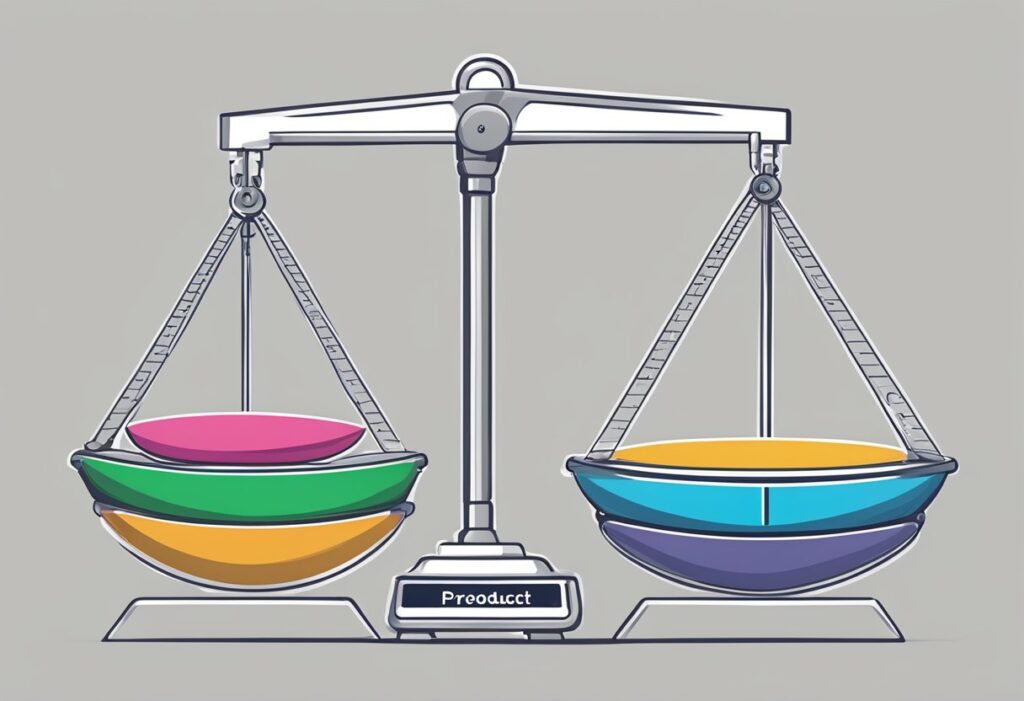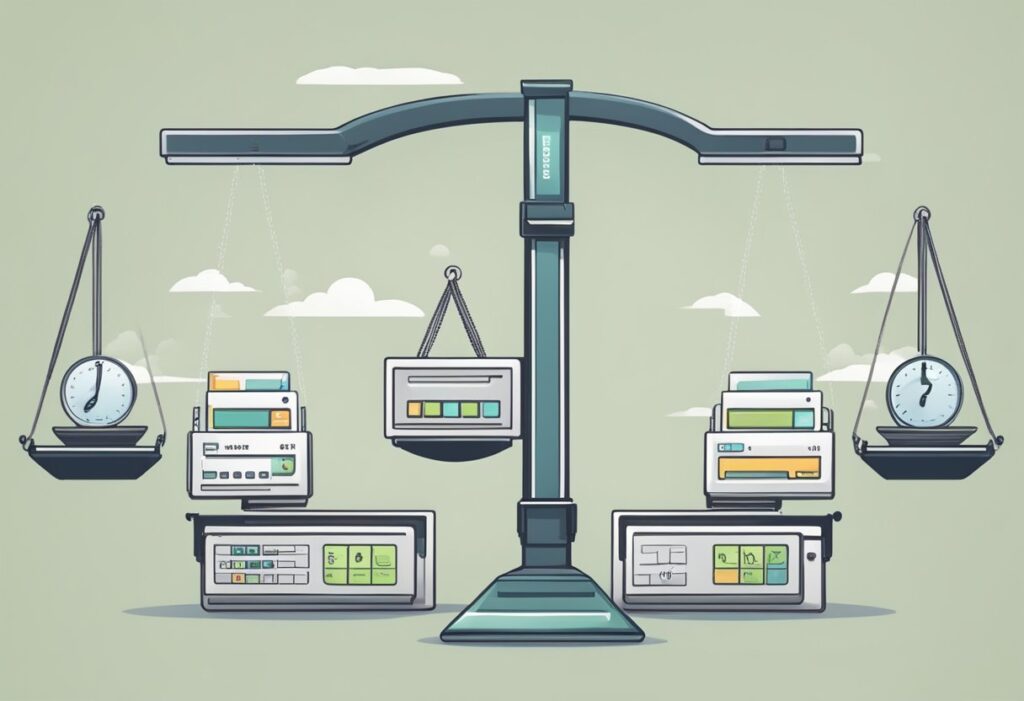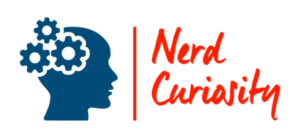When considering career paths, you may wonder about the financial prospects within management roles, particularly between product managers and project managers. Given their collaborative nature yet distinct responsibilities, understanding the earning potential of each can guide your decisions. Both roles are vital in any organization, but they focus on different aspects of business operations.

Product managers typically earn more than project managers. This is attributed to their overarching responsibility for the product’s success including setting vision, understanding customer needs, and guiding cross-functional teams.
In the exploration that follows, you’ll discover more about the roles and responsibilities that define product and project managers, and the factors that influence their salaries. Expect to learn about the differences in their daily tasks, the skills they need to succeed, and how their contributions are valued in terms of compensation within various industries.
Understanding the Roles

To better grasp why compensation might differ between product managers and project managers, you’ll first need a clear perspective on what each role entails. These distinct positions cater to different aspects of a business’s goals, but they often collaborate to bring products to life.
Defining Product Management
Product management is a strategic role where you would focus on the long-term success of a product. This involves setting a clear vision and laying out a roadmap to meet your market’s needs. Your role would be to define the product strategy, prioritizing features and improvements to create a product that resonates with customers. Part of your toolkit would be an understanding of both the business and user needs, ensuring the product’s competitiveness and relevance.
Defining Project Management
Project management, on the other hand, zeroes in on execution. As a project manager, your emphasis would be on the timeline, tasks, and project scope needed to realize organizational initiatives. Your main objectives would be overseeing the various projects required to achieve the product goals laid out by the product management team. You would ensure these projects stay within scope, on time, and on budget, applying a methodical and meticulously planned approach.
Key Responsibilities

In the dynamic world of product and project management, understanding the distinct responsibilities of each role is crucial to discerning their potential impact on the outcome and success of business ventures.
Product Manager’s Responsibilities
Product Managers drive the strategic direction of a product from concept to launch and beyond. Your role encompasses planning the product vision and translating it into a practical roadmap, which often involves extensive market research. By collaborating with cross-functional teams, you ensure that design, usability, and features align with user needs and company goals. Effective communication with stakeholders is key, as you’ll frequently showcase progress and pivot strategy based on feedback and changing market conditions. A product manager is also responsible for clearly defining the outcome your team is aiming for, guaranteeing that the final product resonates with customers and meets the intended launch criteria.
Project Manager’s Responsibilities
As a Project Manager, you’re the tactical driving force that guides projects from the drawing board to reality, focusing on execution and monitoring. Your skillset revolves around managing schedules, resources, and tasks to meet predefined objectives. Staying organized and prepared for potential risks is part of your everyday mission; you’re consistently engaged in risk management. Orchestrating efforts between various departments, you help maintain a steady flow of information and ensure that cross-functional teams work cohesively. Monitoring progress and adapting to changes efficiently keeps stakeholders informed and projects on track. Through your adept oversight, the team’s activities lead to timely delivery within the allotted resources.
Skills and Tools for Success

In the dynamic fields of product and project management, your success hinges on mastering a set of critical skills and leveraging the right tools. Whether you’re guiding a product’s journey from conception to market or orchestrating a project’s many moving parts, here’s what you need to excel.
Essential Skills for Product Managers
As a product manager, you will harmonize product strategy with customer needs. Your role entails not just understanding but anticipating market demands, which requires strong problem-solving abilities and innovative thinking. In your arsenal should be superb communication skills to engage with your team and stakeholders effectively. Here’s a primer on what you should hone:
- Leadership: Steer your cross-functional team with clarity and confidence.
- Product Development: Shape compelling products that align with market desires.
- Soft Skills: Collaborate and negotiate adeptly within your team’s ecosystem.
Essential Skills for Project Managers
For you, as a project manager, your domain is laden with deadlines and deliverables. Your expertise in project management skills is non-negotiable, and like your product-focused peers, communication skills are paramount. You’ll find your days filled with the following must-haves:
- Team Coordination: Keep your project team synchronized and motivated.
- Problem-Solving: Resolve issues swiftly, ensuring project flow remains unhampered.
- Gantt Charts Mastery: Visualize and track project timelines with ease.
Project Management Software
In today’s ever-connected workspace, project management software is your best friend. These tools are critical in tracking progress and fostering collaboration online. You should be proficient in platforms like Asana, which helps you manage tasks and workflows with agility. Familiarize yourself with creating and interpreting Gantt charts, as they’re indispensable for planning complex projects.
- Asana: Organize tasks, share feedback, and monitor deadlines.
- Gantt Chart Tools: Map out project timelines for transparent progress tracking.
Career Path and Certification

Embarking on a career in management—whether in products or projects—can be both lucrative and fulfilling. Certification is a key stepping stone for professional growth, marking your expertise and commitment to the field.
Advanced Certifications for Product Managers
To elevate your role as a product manager, consider obtaining advanced certifications. These not only validate your skills but also open doors to higher-paying roles and a robust career trajectory. The Certified Product Owner designation, for instance, demonstrates your mastery of Agile methodologies, essential for modern, fast-paced product environments. This certification is a testament to your ability to manage product backlogs and prioritize development tasks that align with customer needs and company goals.
Project Management Certifications
For project managers, the Certified Associate in Project Management (CAPM) is a valuable entry-level certification that lays a firm foundation for your career. It’s perfect if you’re just starting out or if project management isn’t your primary role but you wish to understand the basics. Once you acquire experience, the Project Management Professional (PMP) certification could be your next milestone. It’s the gold standard in project management certifications and can significantly boost your career growth and income potential. The PMP certification showcases your expertise in leading and directing projects and teams, an essential skill set for senior project management roles.
Salary Comparisons

When you’re exploring the terrain of management careers, you might be curious about the earning potential of a product manager versus a project manager. Interestingly, the financial rewards in these roles often reflect the scope and impact of the responsibilities.
In the realm of product management, the focus is on steering the development and success of a product or product line. Product managers typically have a vision for the product from conception through its lifecycle, which can command a higher salary due to the increased responsibility for revenue and strategy. As of recent data, they earn an average of $111,222 annually.
Conversely, project managers helm specific projects within an organization. They ensure that goals are met on time and within budget, which is crucial for operational success. The income for a project manager in the US is generally lower, with an average salary of around $88,894 per year.
Salaries do vary depending on experience, location, and the complexity of the products or projects managed. For example, entry-level product managers can expect earnings around $86,000 while seasoned veterans can see over $134,000. On the other hand, project managers with similar experience levels can earn between $70,000 and $120,000 annually.
